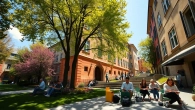
Essential Guide for International Student Life: Tips, Resources, and Opportunities
Understanding the International Student Experience
Defining International Student
An international student is typically defined as an individual who travels to a foreign country to pursue their education, either on a full-time or part-time basis. This demographic can include students enrolled in various educational levels, from high school to postgraduate studies. The reasons for pursuing international education are varied, including gaining exposure to new cultures, acquiring specialized skills, and often pursuing degrees from institutions with global recognition. The experience of being an international student is unique and often filled with both excitement and challenges.
Challenges Faced by International Students
While studying abroad can be enriching, international students often face several challenges that can impact their academic and personal lives. These challenges include:
- Cultural Adjustment: Adapting to a new culture can be daunting. International students often experience culture shock, which can manifest in feelings of disorientation and homesickness.
- Language Barriers: For many, language can be a significant hurdle. Non-native speakers may struggle with academic jargon or day-to-day conversations, affecting their social and academic engagements.
- Financial Constraints: Studying abroad often comes with higher tuition fees and living expenses, making financial planning critical for international students.
- Academic Expectations: Different educational systems may have varying expectations regarding coursework, assessment methods, and classroom participation.
Importance of Cultural Exchange
The experience of an international student goes beyond academic learning. It fosters cultural exchange that benefits the host country and the student. Students bring diverse perspectives, enriching classroom discussions and campus life. The exchange of ideas can spark innovation and promote global understanding, which is crucial in our interconnected world.
Navigating the Visa Process as an International Student
Types of Student Visas Explained
When it comes to studying abroad, understanding the types of student visas available is crucial. The primary visa categories for international students include:
- F-1 Visa: This is the most common visa for students attending full-time academic programs in the U.S. It allows for some employment opportunities under specific conditions.
- M-1 Visa: This visa is intended for students enrolled in vocational or non-academic programs.
- J-1 Visa: It is designated for students participating in exchange visitor programs, providing a platform for cultural exchange as well as education.
Application Steps for International Student Visas
The application process for a student visa can be intricate and requires several key steps:
- Acceptance into a U.S. Institution: Secure an admission offer from a SEVP-approved school.
- Gather Documentation: Required documents typically include a valid passport, Form I-20 (for F-1), financial proof, and standardized test scores.
- Complete the Visa Application Form: Fill out Form DS-160 for a non-immigrant visa.
- Schedule an Interview: Book an appointment at a U.S. embassy or consulate for your visa interview.
- Attend the Visa Interview: Prepare for this appointment, as it could determine your eligibility for a visa.
Understanding Visa Regulations and Compliance
Compliance with visa regulations is critical. International students must maintain their student status by enrolling full-time and abiding by the conditions outlined in their visa. Staying informed about any changes in visa policy is essential to ensure a smooth academic journey.
Financial Planning for International Students
Tuition Fees and Living Costs
Financial literacy is vital for international students to navigate the costs of education abroad effectively. Tuition fees can vary drastically depending on the institution and program chosen. Additional living expenses, which include housing, food, healthcare, and transportation, should also be carefully considered. Budgeting is key, and students should look into various strategies to manage their finances effectively.
Finding Scholarships for International Students
Scholarships and financial aid are available to help offset costs. Various organizations and institutions offer scholarships specifically for international students. Some avenues to explore include:
- University-specific scholarships and grants aimed at international students.
- Government-sponsored programs that offer financial assistance.
- Scholarship databases that allow students to search for opportunities tailored to their situation.
Tips for Budgeting Effectively
Effective budgeting involves tracking your income and expenses, prioritizing needs over wants, and utilizing financial tools such as budgeting apps. Creating a monthly budget will help international students manage their limited resources while ensuring they can cover necessary expenses.
Academic Resources and Support for International Students
Utilizing Campus Resources
Institutions often have numerous resources available to support international students, including:
- International Student Office: Offers guidance on visa-related questions and concerns.
- Academic Support Centers: Provide tutoring, writing assistance, and workshops to help students adapt to the academic environment.
- Counseling Services: Support available for mental well-being and adapting to life in a new country.
Building Relationships with Faculty and Peers
Engaging with faculty members and fellow students enriches the educational experience. Professors can offer mentorship, guidance, and resources, while relationships with peers can lead to friendships and collaborative academic opportunities.
Accessing Online Learning Tools and Libraries
Most learning institutions provide various online tools and access to digital libraries. Familiarizing yourself with these platforms can enhance your learning experience, making it easier to access quintessential texts and resources necessary for your courses.
Community Building and Networking for International Students
Joining Student Organizations and Clubs
Getting involved in campus life through student organizations and clubs is essential for personal growth and creating a support network. Many colleges have specific organizations for international students that foster a sense of belonging and community.
Attending Cultural Events and Workshops
Cultural events provide opportunities for international students to showcase their backgrounds while also learning about others. Participating in workshops can enhance skills such as public speaking and intercultural communication, vital in both personal and professional realms.
Creating Lasting Connections with Fellow International Students
Building connections can lead to lifelong friendships. Engaging with other international students can provide a platform for sharing experiences and challenges, and creating a supportive community that can enhance the study abroad experience.












Leave a Reply